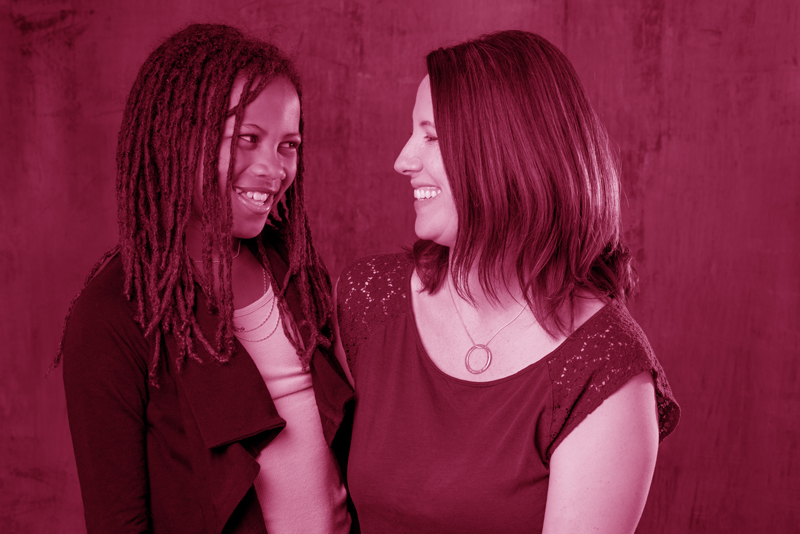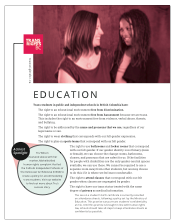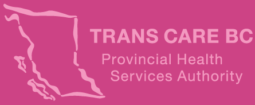Update: For information regarding the addition of Gender Identity and Expression to the 2016 BC Human Rights Code, and to the 2017 Canadian Human Rights Act, please visit the Explicit Protection page.

The Minister of Education announced on September 8, 2016 that all British Columbian boards of education and independent school authorities were required to reference sexual orientation and gender identity (SOGI) in district and school codes of conduct by December 31, 2016.
Trans students in public and independent schools in British Columbia have:
- The right to an educational environment free from discrimination.
- The right to an educational environment free from harassment because we are trans. This includes the right to an environment free from violence, verbal abuse, threats, and bullying.
So far there are no human rights cases specifically about trans students. Only some school boards have policies protecting trans students. But the principles of human rights law require schools to accommodate trans students. Accommodation includes, most importantly, the right to be treated according to our gender identity, whether that is male, female, or non-binary. It doesn’t matter what our genitals look like.
The right to be accommodated as a trans student includes:
- The right to be addressed by the name and pronouns we use, regardless of our legal name or sex.
- The right to wear clothing that corresponds with our gender expression.
- The right to play on sports teams that correspond with our gender identity.
- The right to use bathrooms and locker rooms that correspond with our gender identity. If our gender identity is not binary (male or female), we can choose the change rooms, bathrooms, classes, and pronouns that are safest for us. If the facilities for people with disabilities are the only gender-neutral spaces available, we can use those. We cannot be required to use a separate room away from other students, but we may choose to do this if it is where we feel most comfortable.
- The right to attend classes that correspond with our gender identity when classes are segregated by gender.
- The right to have our trans status treated with the same degree of privacy as medical information.
- The sex on a student’s birth certificate is currently recorded on attendance sheets, following a policy set by the Ministry of Education. This practice can put trans students’ confidentiality at risk. Until this practice is brought in line with human rights law, schools should take all steps to keep attendance sheets as confidential as possible.
What laws protect trans students?
- School boards have a legal duty under the BC Human Rights Code to make sure that their schools are free from bullying, harassment, and discrimination. They also have a legal duty to accommodate students who have particular needs in order to be able to participate equally with other students in the classroom. That means school boards must have effective policies and procedures for accommodating trans students and keeping us safe. The accommodations listed above are widely recognized as best practices. School boards that do not currently have policies ensuring that trans students are accommodated in these ways must modify their policies in order to meet their legal obligations.
- In addition to the BC Human Rights Code, the Charter of Rights and Freedoms guarantees equality to trans students in public schools. Independent schools may argue that they do not need to accommodate you for religious reasons, but there are limits to this argument. For example, Tracey Wilson was a trans elementary school student in a Catholic school. She filed a human rights complaint against the Catholic Independent Schools of the Vancouver Archdiocese (CISVA). Her case was settled when the CISVA agreed to implement a policy in line with the accommodations listed above. Learn more about the CISVA Gender Dysphoria Policy.
- The Criminal Code is available if a trans student is harassed, assaulted, or sexually assaulted. Talk to the police or a Victims Services organization.
How can you stand up for your rights?
Despite having rights, many trans students experience bullying and harassment in schools. Standing up for your rights can be difficult, especially if you are a youth and your parents are not supportive. Find other allies. For example, your school or school district may have a person designated to support queer and trans youth.
- Make sure you keep a journal of each event of discrimination and harassment you face. Include the 5 W’s: who, what, where, when, and why. Note all meetings you have, requests you make, and what happens. It is very hard to remember things accurately unless you do this.
- Work with your school to make an accommodation plan. If your school has a trans-inclusion policy in place, it will set out a process for how you can work with the school to make a plan. If your school does not have a trans-inclusion policy in place, speak with the principal. You may have to educate the principal about what it means to be trans and what accommodations you require. You may want to show them some of the booklets and model policies in the Resources section of this website.
- If the school fails to follow their policy, or refuses to accommodate you in the ways listed above, the next step in most school districts is to complain to the Office of the Superintendent.
- If you are not satisfied with the outcome, you can file a Human Rights Complaint. If you are having an issue with a private or religious school, get legal help. Even though the human rights process is slow, filing a complaint can give you leverage in dealing with your school. A tribunal can order that the school stop discrimination and develop trans-inclusive policies.
- If what you are experiencing at school causes harm to your body or makes you fear for your safety, you may choose to report a crime to the police.
- Start a club or group to promote understanding of gender diversity. Your group can organize campaigns and events to create a more supportive school culture for queer and trans students.
- You can sue your school board in the BC Supreme Court for a violation of your equality rights under the Canadian Charter of Rights and Freedoms. So far, nobody has done this, but you could be the first. You would need a lawyer. This is the most expensive option. It could easily cost $50,000. It could take several years to resolve.
Who can you go to for help?
- Check out resources by the BC Safer Schools Coalition. They are a network of students, parents, educators, and helping professionals that advocates for the development of trans-inclusive policies in school districts.
- For a free legal assessment of your situation, contact the Catherine White Holman Wellness Centre . Email lawyer@cwhwc.com to book an appointment.
- CWHWC has a legal clinic for trans and gender diverse people twice a month. There is a waitlist. Clinic lawyers are not able to represent you, but they can give you a list of lawyers who specialize in human rights complaints. If you cannot travel to the Catherine White Holman Wellness Centre, you may be able to set up an appointment by Skype.
- Another organization called Access Pro Bono has over 75 legal advice clinics throughout the province. Not all Access Pro Bono lawyers will be familiar with trans legal issues. For more information about Access Pro Bono and the programs it offers, or to find a legal advice clinic in your area, go to: accessprobono.ca or call: 1-877-762-6664.
- To find a lawyer, call the BC Branch of the Canadian Bar Association at 604-687-3221 or 1-800-663-1919 (Monday to Friday, 8:30am to 4:30pm). They can give you the name of a lawyer who does Human Rights Complaints and Charter cases, and who will have a consultation with you for up to 30 minutes for a fee of $25 plus tax.
- To find the contact information for a lawyer whose name you already know, you can use the Lawyer Lookup tool.
- For help filing a human rights complaint, contact the BC Human Rights Tribunal. They may also be able to represent you. However, there are rules about what cases the Tribunal takes on. Contact them at 604-775-2000 in the Lower Mainland or 1-888-440-8844 in the rest of BC.




